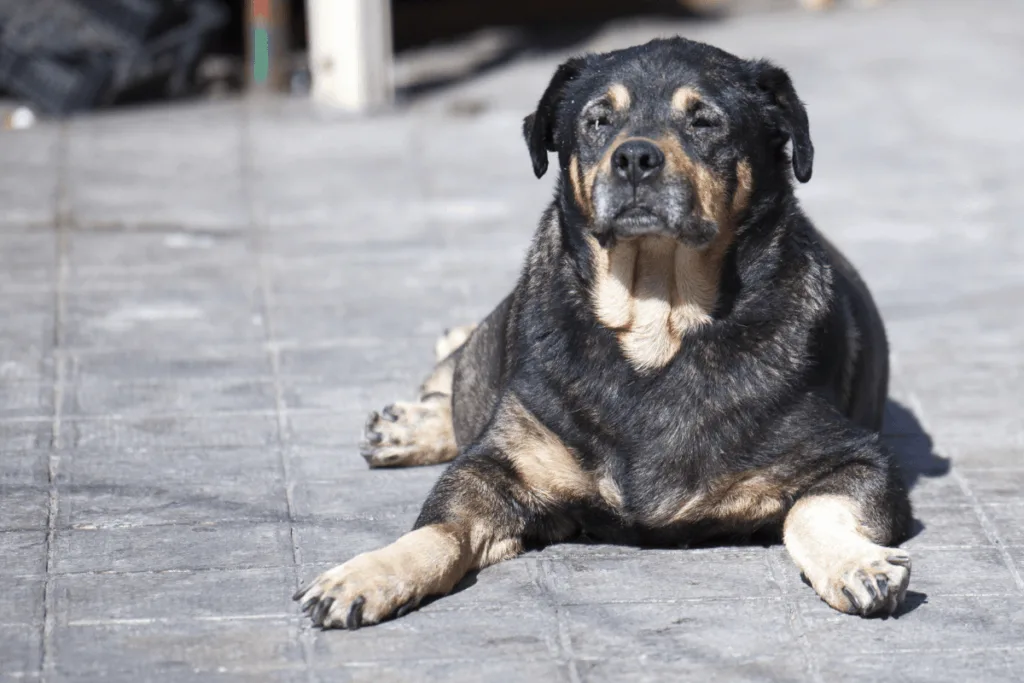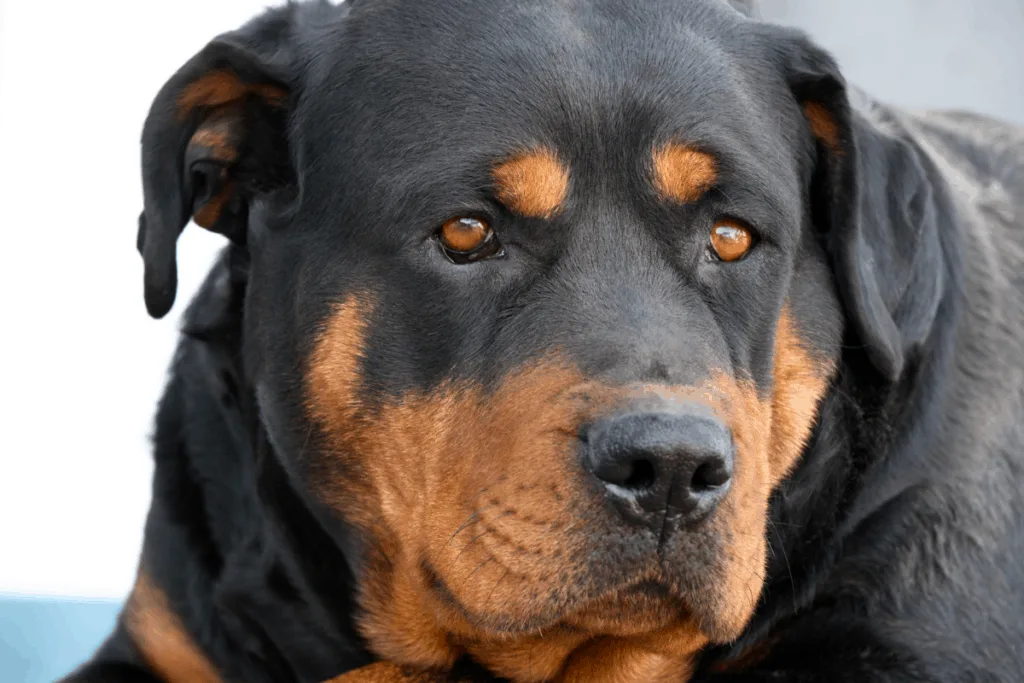Rottweilers, being a large breed, have an average lifespan of nine years. Females tend to live slightly longer than males by a period of ten months or so.
However, in many cases, Rottweilers have been known to live for twelve or thirteen years.
This begs the question: when do Rottweilers go grey?
Typically, a Rottweiler starts to go grey from five years onwards. The age at which a Rottweiler goes grey depends on their anxiety and stress levels. Therefore, it is not unusual for a dog of four years or younger to show some grey if they have a stressful lifestyle or are highly impulsive or fearful.
Large dog breeds die relatively young because they age faster than small ones.
A study published in 2013 in the American Naturalist journal showed a strong correlation between body size and mortality hazard.
Like humans, dogs tend to go grey in the latter half of their life.

Click Here to Jump to a Section
Genetics Plays A Role in Rottweiler Aging
Old dogs tend to go grey only around the face and muzzle and not through the rest of the coat.
Some Rottweilers go grey earlier than others, so the age at which this occurs can vary between individuals.
If your Rottweiler shows greying at a very young age, it is advisable to take them for a health check to a veterinarian to ensure there are no underlying health issues.
Hyperthyroidism can sometimes cause premature greying, and treatment usually reverses it.
Kidney or liver disease may, on rare occasions, also cause greying.
The Rottweiler is also one dog breed among several known to be prone to a skin condition called vitiligo. This can result in the loss of pigment in patches of fur and skin, causing it to go white.
Vitiligo is more common in pedigreed dogs because it is hereditary. However, it is very rare.
Usually, veterinarians regard dogs between the ages of seven and ten as seniors. However, this depends on the size of the breed and the average lifespan.
A ten-year-old Rottweiler is quite an old dog already, given that the average lifespan is nine years.
According to the American Veterinary Medical Association (AVMA), large dog breeds are considered geriatric at the age of six.
Some dogs are just genetically predisposed to go grey earlier than others, even within the same breed.
The good news is that with sound dietary habits and improved veterinary care, dogs are living for longer.
Examples:
- A dog that weighs between sixty-six and seventy-eight pounds is ten years old in dog years when he is one year old in human years.
- One that weighs between ninety-three and one hundred and fifteen pounds is fifteen years old in dog years.
Male Rottweilers can weigh between eighty-five and one hundred and thirty-five pounds, depending on their genes. Females are lighter, weighing in at between eight and one hundred pounds.
So, by the time they reach the age of five in human years, they could be as much as seventy-five years old in dog years.
These figures are just estimates provided by the AVMA to give people an idea of how dogs age, depending on their size.
Exceptionally Long-Lived Rottweilers

Some Rottweilers can be exceptionally long-lived for their breed and can reach the age of thirteen or more.
A study has been conducted on these old Rottweilers, who are more than one hundred years of age in human terms.
The Rottweiler Health Foundation awarded Dr. David Waters, director of the Center for Exceptional Longevity Studies at the Gerald P Murphy Cancer Foundation, a five-year grant in 2007.
The object of the grant was to support his research into cancer and longevity in Rottweilers.
The American Rottweiler Club helped to identify suitably old dogs for the study.
Dr. Waters found that the likelihood of a Rottweiler dying from cancer rose until they turned ten, whereafter the risk began to drop.
Interestingly, he discovered that exceptionally old dogs were less likely to die of cancer than those of more typical longevity.
As the study progressed, he hoped to identify genetic and lifestyle factors contributing to cancer resistance and longevity.
The study of cancer in dogs, who have a much shorter lifespan than people, can assist research on cancer in humans because they have many similarities regarding this disease.
Factors Affecting Aging In Dogs
Several factors affect how a dog ages, ranging from diet to lifestyle to gender.
Dr. Waters found that female Rottweilers are twice as likely as males to live to exceptionally old age.
Also, the longer the girls kept their gonads, the longer they lived.
The study showed that if the females kept their ovaries for longer than four years, their chances of exceptional longevity increased to more than three times those of males.
Removing the ovaries in the first four years of life erased this advantage.
This is food for thought when considering when is the right time to spay your Rottweiler. According to Dr. Waters, genetics only accounts for around thirty percent of aging while the remaining seventy percent involves lifestyle decisions.
Obesity can be a problem that is likely to shorten a Rottweiler’s lifespan because they are large, heavy dogs to begin with.
In 2003 a study was conducted on Rottweilers to ascertain whether there was a link between sex hormones and bone cancer (sarcoma).
Researchers found that the risk for bone cancer was considerably influenced by the age at which a dog was neutered or spayed.
If the dog was de-sexed before one year of age, they were significantly more likely to develop bone cancer than sexually intact dogs.
Therefore, owners of Rottweilers need to think carefully when it comes to diet, vaccinations, de-sexing, and exposure to chemicals such as those used on lawns and in gardens.
As the dogs age, dietary changes may be necessary to help them have long and healthy senior years.
Final Thoughts
Healthy Rottweilers usually go grey around the face and muzzle in their senior years, starting from around the age of five.
However, if they go grey earlier than this, it is generally not cause for concern if your dog has recently had a health check.
Lifestyle and genetics play a critical role in how fast a dog ages, and there is much that you can do to ensure your dog lives a long and healthy life.
